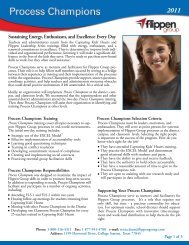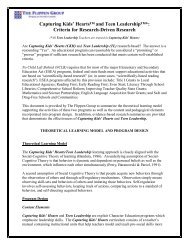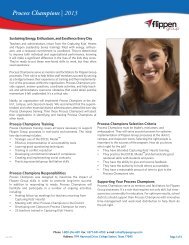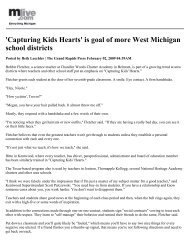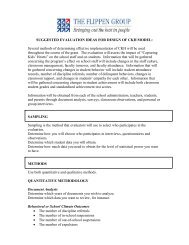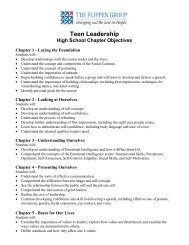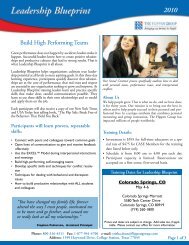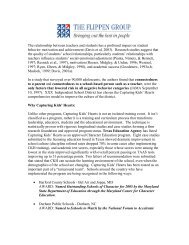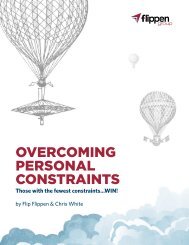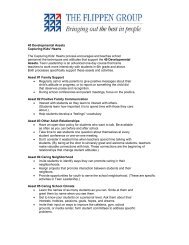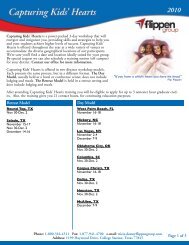Smart & Good High Schools - The Flippen Group
Smart & Good High Schools - The Flippen Group
Smart & Good High Schools - The Flippen Group
- No tags were found...
You also want an ePaper? Increase the reach of your titles
YUMPU automatically turns print PDFs into web optimized ePapers that Google loves.
CHAPTER 5: Fostering the 8 Strengths of Character—Outcome 65. On the basis of their self-assessment, students developanother plan for the next semester.Says the instructor: “By the end of the first semester, somehave worked wellness into their lifestyles, but others havenot. We want everyone to learn from their experience,make adjustments, and keep trying.”At another school we visited, all students take a fitnessclass, and all school members—staff and students—do fitnessactivities for the last 20 minutes of the school day.Some can be found playing basketball, some working outin the weight room, some doing other forms of exercise.Said a girl at this school: “My overall self-discipline hasdefinitely benefited from our school’s strong emphasis onexercise and pursuing a healthy lifestyle.”“Doing School”: Self-Discipline Run AmuckOne benefit of a schoolwide course such as the WellnessWorkshop is that it helps students develop a vision of, andcommitment to, a lifestyle that balances work with physical,mental, and emotional health. Unless self-discipline isanchored in that kind of commitment to a balancedlifestyle, it can easily run amuck, especially in today’shighly competitive environment.In her book, “Doing School”: How We Are Creating a Generationof Stressed Out, Materialistic, and Miseducated Students,educator Denise Pope describes students who have plentyof self-discipline but are not using it to pursue meaningfullearning or healthy lifestyles. 19 <strong>The</strong>se students, in theirown words, are “doing school.” Pope writes:<strong>The</strong>y focus on managing their workloads and cutting corners.<strong>The</strong>y memorize facts and figures just long enough toace their exams and then move on to the next set of tasks.<strong>The</strong>y admit to scheming, lying, and cheating to get thegrades they believe they need for future success. 20Some call themselves “robo-students,” Pope says. “<strong>The</strong>ydrag themselves through the school day, exhausted andliving in a constant state of stress. Some sacrifice sleep,healthy eating, and exercise to pursue high grade-pointaverages. Others suffer from anxiety and depression.”Pope concludes: “Now more than ever before, pressurefor high achievement in school has become a significantrisk factor for adolescent mental and physical health.” 21One honor student interviewed in Pope’s study was takingseveral advanced placement classes and was involved inseveral school clubs. She also played field hockey andbadminton and performed in the school band. Shedescribed her life:I sometimes have two or three days where I get two hoursof sleep per night. I see lots of my friends burned out.Some people see health and happiness as more importantthan grades and college; I don’t. 22“Pressure for high achievementhas become a significant risk factorfor adolescent physicaland mental health.”<strong>The</strong> Stressed Out Students (SOS) Project<strong>The</strong> Stressed Out Students (SOS) project at Stanford University’sSchool of Education seeks to address the “doingschool” syndrome. Directed by Denise Pope, the SOSproject has worked with high schools to implement variousstrategies aimed at reducing student stress. (See box.)STRESSED OUT STUDENTS (SOS) PROJECT:5 STRATEGIES FOR REDUCING STRESS1. Collaborate with students and parents. Survey studentsand parents about issues related to academicstress, including student workload, homework time, cocurricularactivities, sleep habits, course expectations,and college admissions. Use this information to determinethe degree of the problem, make changes, andassess progress.2. Improve the use of time. Consider block scheduling asa way of reducing the number of classes. Createschoolwide test and assignment calendars so that studentsdon’t have multiple tests or major projects dueon the same day. Examine the purpose of homework;emphasize quality rather than quantity.3. Develop mental health initiatives. Offer classes orworkshops on time management and stress reduction.4. Redefine success. Consider not ranking students byGPA or naming a valedictorian. Give awards—e.g., forcharacter and community service—that recognizemoral excellence as well as intellectual excellence.5. Raise parents’ awareness. Offer parent educationevenings to address the pressures that well-meaningfamilies sometimes place on their children. Explain thatcollege should not be considered a status symbol butshould represent a best fit between the student andthe school. 23165<strong>Smart</strong> & <strong>Good</strong> <strong>High</strong> <strong>Schools</strong>



